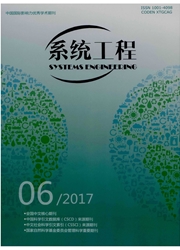

 中文摘要:
中文摘要:
在前人相关研究成果的基础上,针对中国股票市场机构投资者的实际情况,在假设机构投资者过度自信的条件下,建立数学模型、从理论上研究机构投资者过度自信心理偏好对中国股票市场风险的影响机理。研究结果表明:机构投资者过度自信程度越高,股票市场价格波动性和股票交易量越大,股票价格围绕其期末价值波动的幅度越小;当机构投资者过高估计其所掌握信息的精确性时,其期望收益将随着其过度自信程度的提高而减少。研究结果可以在一定程度上解释中国股票市场存在的高换手率现象、暴涨暴跌现象以及机构投资者经营业绩不高的现象,是对传统金融市场理论的深化和发展。
 英文摘要:
英文摘要:
On the basis of previous research results, according to the actual situations of institutional investors in the Chinese stock market, under the hypotheses condition that the institutional investors are overconfident, this paper studies the effect mechanism of the effect of institutional investors' overconfident psychological preference for Chinese Stock Markets by setting up an appropriate mathematical model theoretically. The research results show that the price volatility and trading volume of Chinese Stock Market will rise with the increase in institutional investors' overconfidence level, and the fluctuation of the stock price around its end-period value will decrease in institutional investors' overconfidence level, while the fluctuation of the stock price around its end-period value will decrease, and institutional investors' expected return will decrease in their overconfidence level when institutional investors overestimate the accuracy of the information in their hands. The research results can, to some extent, explain the phenomena such as the high exchange rate, rapid and significant ups and downs of stock prices, and lower operating performances of institutional investors in Chinese Stock Markets. This research work deepens and develops the traditional theory of financial market.
 同期刊论文项目
同期刊论文项目
 同项目期刊论文
同项目期刊论文
 期刊信息
期刊信息
